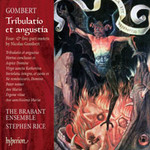
Tribulatio et angustia
 $45.00
Special Order
$45.00
Special Order3 - 6 weeks add to cart
NICOLAS GOMBERT
Tribulatio et angustia
The Brabant Ensemble / Stephen Rice
[ Hyperion / CD ]
Release Date: Thursday 4 October 2007
This item is only available to us via Special Order. We should be able to get it to you in 3 - 6 weeks from when you order it.
GRAMOPHONE MAGAZINE AWARD FINALIST 2008 - Early Music - "It's one of very few discs of this repertoire I've been happy to play in its entirety, and then several times since. This is in part a tribute to Gombert … but also to the Brabant Ensemble and Stephen Rice" GRAMOPHONE EDITOR'S CHOICE
MARBECKS STAFF PICK - BEST RECORDINGS 2008
GRAMOPHONE MAGAZINE AWARD FINALIST 2008 - Early Music GRAMOPHONE EDITOR'S CHOICE
'It's one of very few discs of this repertoire I've been happy to play in its entirety, and then several times since. This is in part a tribute to Gombert … but also to the Brabant Ensemble and Stephen Rice … By encouraging an unusually individual and carefully balanced vocal response, he avoids the pitfalls of relentless consistency and arrided elision … There is a welcome and (in this music) novel belief in the power of voices as voices … Try the sopranos halfway through Hortus conclusus est for erotic Mariolatry at its most disconcertingly sensual. Arise, make haste, as they sing, and hear this music' (Gramophone)
'… The sheer quality of his music. These 10 motets are notable for their richly glowing sonorities, their disciplined counterpoints, their intensity of expression and, most of all, their careful tailoring of music to text. There's the drnkly erotic intensity of Hortus conclusus es, the anst-ridden, pentitential Tribulatio et angustia … The singing is meticulously balanced and blended, Stephen Rice shaping and pacing each work with exquisite judgement' (Sunday Times)
'The Brabant Ensemble's exploration of the "forgotten generation" of composers between Josquin and Palestrina is reviving an abundance of unwarrantedly neglected sacred polyphony. Judging by this splendid selection of motets, Gombert's neglect is particularly flagrant. In penitential pieces, such as Aspice Domine and Tribulatio et angustia, his lavish use of dissonance within a smooth-flowing yet intricately imitative style creates an atmosphere of almost unbearably intense and bitter anguish, whether contemplating a city laid waste or beseeching rescue from a foetid quagmire … These shapely and well-paced performances do full justice to Gombert's outstanding talent' (The Daily Telegraph)
'This is impressively accomplished ensemble singing … Rice's own booklet notes provide fascinating insights into the music … It is this intelligent approach to the spirit of the text (there is a glorious moment in Hortus consclusus es when the soprano soars ethereally to the line 'arise, make haste my beloved'), coupled with outstanding tuning and balancing, which makes this such a distinguished group. The Brabant Ensemble are quickly establishing themselves as one of the more impressive English groups specializing in Renaissance msuci, and this, their fourth CD release, only increases their stature' (International Record Review)
This is The Brabant Ensemble's third disc for Hyperion. Under their director, eminent musicologist Dr Stephen Rice, they continue to excavate jewels of the sixteenth-century choral repertoire which have until now remained underperformed and under-represented in music history. Their natural and instinctive performing style, which foregrounds the essential vocal qualities of this music, unlike the instrumental tone of other early music choirs, brings these beautiful and complex works abundantly to life.
Gombert's motets are the heart of his writing and this selection of them allows the range of his musical accomplishments to fully emerge. Often seen as written in penance for heinous crimes committed by the composer, many of them are settings of various texts of penitence, sorrow and yearning for deliverance from punishment. Images such as the 'hellish lake' in Tribulatio et angustia are dramatically explored. Also on this disc are motets for the adulation of the Blessed Virgin Mary, which surprisingly demonstrate an especially intensified and dissonant musical style, showing the almost erotic level of devotion suggested in some of the greatest art of this period.
Tracks:
Tribulatio et angustia
Hortus conclusus es
Aspice Domine
Virgo sancta Katherina
Inviolata
Inviolata, integra, et casta es, Maria
Ne reminiscaris, Domine
Pater noster
Ave Maria
Ergone vitae
Ave sanctissima Maria



